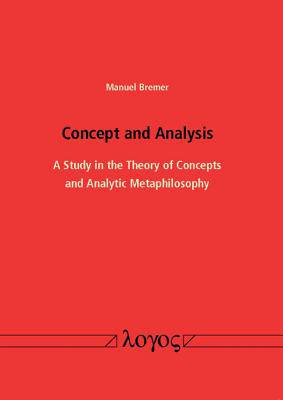
- Retrait en 2 heures
- Assortiment impressionnant
- Paiement sécurisé
- Toujours un magasin près de chez vous
- Retrait gratuit dans votre magasin Club
- 7.000.0000 titres dans notre catalogue
- Payer en toute sécurité
- Toujours un magasin près de chez vous
Concept and Analysis
A Study in the Theory of Concepts and Analytic Metaphilosophy
Manuel Bremer
Livre broché | Anglais, Allemand
64,45 €
+ 128 points
Description
The book aims to set out in which respects concepts are properly studied in philosophy, what methodological role the study of concepts has in philosophy's study of the world, why there are several viable methods of analysis and even conceptual analysis has its place here. Many of the considerations in this book nowadays are placed under the headline 'metaphilosophy'. The book starts with some bold theses in favour of a representationalist theory of meaning and concepts which serve as the background for the discussion in the following chapters. In contrast to paradigmatic ordinary language philosophy the book endorses a representationalist theory of meaning and concepts, thus agreeing with many of its critics in philosophy and the cognitive sciences. In contrast to many of these critics and supposedly the majority of cognitive scientists it endorses the viability of conceptual analysis as one method of philosophy. The book reflects on Frege's theory of concepts, because Frege's theory of concepts was one strand that inaugurated analytic philosophy. Frege's theory of sentential unity has barely been superseded, and the problems arising from Frege's understanding of concepts are still alive. Frege's theory and the related problems in Frege's logic as in the Grundgesetze der Arithmetik (most famously the antinomy known as 'Russell's Paradox' going back to Frege's 'Basic Law V') lead over to considering the proper approach to our concept of logic and the issue of psychological and ontological realism in logic and mathematics. The central part of the book starts by reconsidering the approach and the idea of ordinary language philosophy and its understanding of conceptual analysis. Although ordinary language philosophy cannot be the whole of analytic philosophy a proper understanding of conceptual analysis turns out to be one part of analytic philosophy. This part starts with a general discussion of ordinary language philosophy, but proceeds then by a methodological overview and attempts to engage in some ordinary language philosophy concerning epistemological topics.
Spécifications
Parties prenantes
- Auteur(s) :
- Editeur:
Contenu
- Nombre de pages :
- 157
- Langue:
- Anglais, Allemand
Caractéristiques
- EAN:
- 9783832534974
- Date de parution :
- 10-09-13
- Format:
- Livre broché
- Format numérique:
- Trade paperback (VS)
- Dimensions :
- 145 mm x 211 mm
- Poids :
- 198 g

Seulement chez Librairie Club
+ 128 points sur votre carte client de Librairie Club
Les avis
Nous publions uniquement les avis qui respectent les conditions requises. Consultez nos conditions pour les avis.





